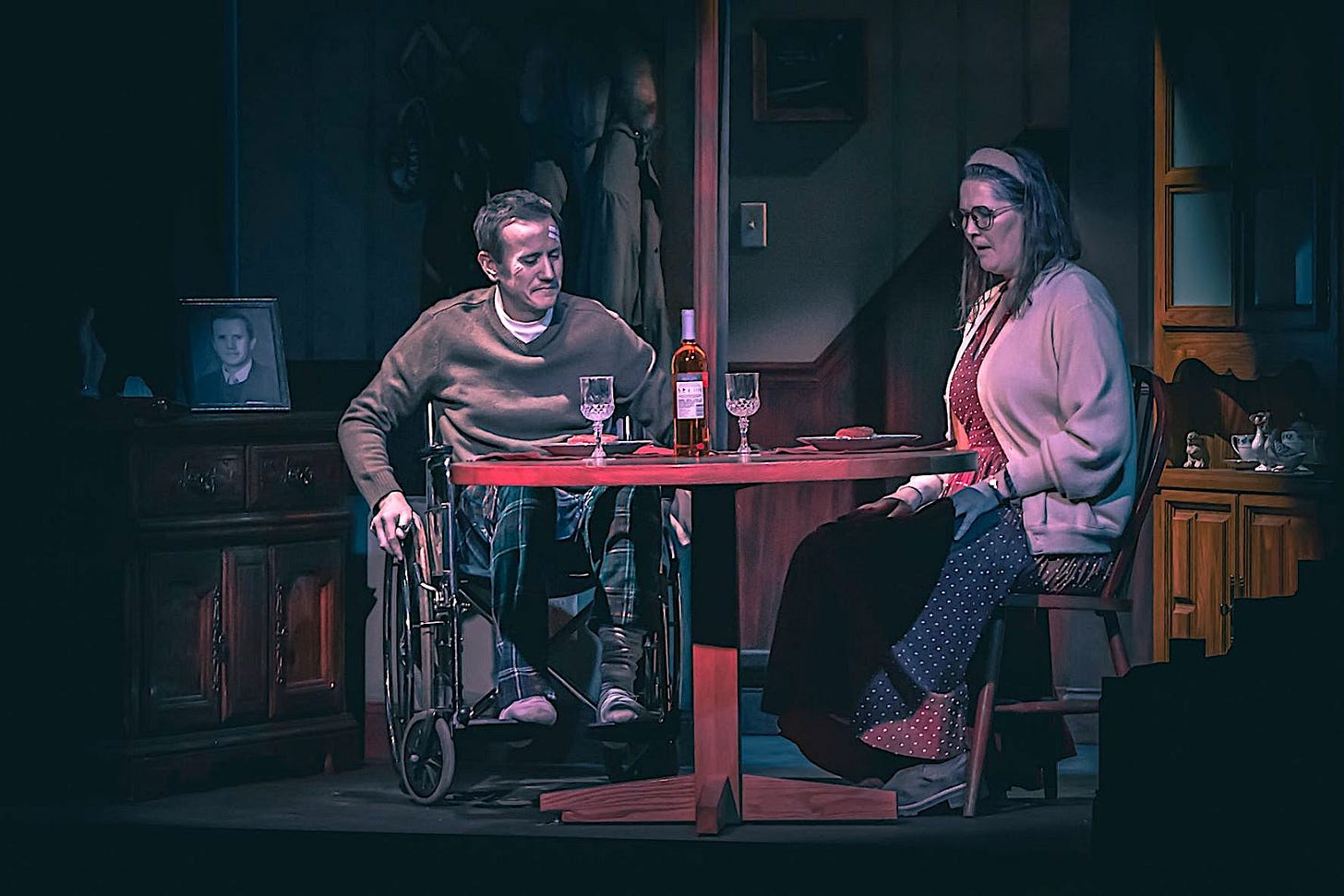Stage: Misery at Theatre Charlotte
With a scene-stealing performance by Becca Worthington, Misery runs through Sunday, March 19
In her guest room on the set of Misery, now at Theatre Charlotte, nurse Annie Wilkes confesses her love to her captive, the author Paul Sheldon.
She knows that the complex terms she set to voluntarily release him are almost up, and she doesn’t want him to leave.
“Why would I leave?” Sheldon says reassuringly, played by Timothy Hager. “I like it here.”
In this scene, actor Becca Worthington’s affable tone, present much of the time in her portrayal of Wilkes, drops to a matter-of-fact deadpan.
“That’s very kind of you. But I bet it’s not altogether true.” She produces a revolver from the side pocket of her robe. “I have this gun. Sometimes I think about using it.” She pauses. “I better go.”
And then, an afterthought: “I might put some bullets in it.”
Misery at Theatre Charlotte
Based on the novel by Stephen King
Adapted by William Goldman
Directed by Ron Law
Running March 3-19
Buy Tickets
Paul’s legs have been broken, and his caretaker-turned-captor his him hopped up on a cocktail of painkillers and sedatives. No matter the strength of will he musters over and over in Misery, Sheldon is physically vulnerable to Wilkes. Her ambivalence around what she will do with the gun mirrors the tightrope walk that is this story, teetering between the relief of Paul’s safety and the foreboding uncertainty that he won’t come out of this alive.
Christy Edney Lancaster’s work on sound design, coupled with Chris Timmons’ lighting work, sets a tone both dark and humorous from the moment you set foot in the theater. Rather than raising a curtain to open the show, Timothy Hager is asleep in bed on the dark set as the audience enters. Thunder and lightning from the raging storm outside provide some pre-show jumpscares.
Delightfully, acknowledgements and promotions normally delivered in a curtain speech before the show have been transformed into advertisements blaring over Annie Wilkes’s radio, which she loves to keep on. At my performance, the technical crew got a laugh all their own when Annie retired to her upstairs bedroom, the blue television light illuminated the window, and the theme from M.A.S.H. sounded from the stage.
Chris Timmons’ set expands on a familiar cross-section design to give the audience a greater view into Wilkes’s home than Sheldon has from his bed. As often found on a stage, we see through the absent fourth walls into Sheldon’s room and the living room next to it. Yet, deeper interior walls are cut out and singed as if by fire, evoking the burning manuscripts in the second half of the play (as well as the fire that devastated Theatre Charlotte’s facility in 2020).
We can see further into the home, with an eye on Wilkes as she moves around. We can also see her exterior second story bedroom window, illuminated by the television she watches at night. The half open, half obscured set both underpins Paul’s fear and deepens our fear for him. Yet, it turns out the set is the only leg up we have on the bedridden author. Apart from the clues afforded by our perspective, the audience is exactly as unsure of Annie Wilkes’ intentions as Paul Sheldon is.
This suspense, a constant discomfort, arises from Becca Worthington’s individual choices. Please forgive this aside: no review of this stage production can avoid comparison to the 1992 film adaptation, and it is necessary to mention Kathy Bates’ characterization of Wilkes to understand what makes seeing Worthington at Theatre Charlotte so special. Bates’ performance is deliberate, but nevertheless sweeps up and down the Richter scale; Bates shrieks with uncontrolled fury as she admonishes him for killing her favorite character in his novels, and is barely above a whisper in the pathetic moment she reveals both her love and her gun.
For this production, Worthington could have emulated Bates’ performance note for note and still delivered a performance with great impact. Instead she pivots, taking a tack of greater relatability. She is the friendly neighbor we all have met – a little awkward, perhaps, but comfortably self assured. Just as with Bates’ Wilkes, it is her first moments of departure from a pleasant demeanor, and her jarring returns to it, that are so unsettling. Worthington’s choice of greater self-possession, however, makes her dark undercurrents more surprising, and her bad decisions more final. Worthington makes Annie Wilkes scary in a whole new way.
The suspense builds in layers as Paul Sheldon’s captivity continues and we learn about Annie’s attachment to his novels. Two crucial moments of violence on stage, given too light a treatment in choreography, technique, and emotional dynamics, threaten to interrupt an otherwise seamless build. Despite this, Worthington carries the audience’s attention from the beginning to the end. The show is tight, nerve wracking, and thrilling.






So bummed to have missed this one!